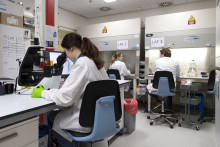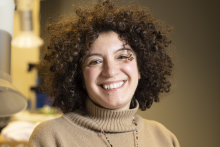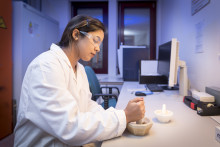Board member Vanessa Magnanimo, Adjunct Professor of soil micro mechanics, has been involved since the early years. Together with Heather Handley, Associate Professor of volcanic hazards and geoscience communication they co-chair the network.
Twenty years of women's network. What can we say about the current position of women at the UT?
Magnanimo: 'In the first period from 2005 to 2020, it was mainly about the numbers. Six percent of full-time professors were women in the early years. The focus was on attracting female talent. Currently, the share of full-time female professors at the UT is 24 percent. According to the annual monitor of the Dutch Network of Women Professors (LNVH), the three technical universities in the Netherlands have the lowest percentage of women professors among all academic institutions in the country. And that has actually been the case for years.’
How frustrating is that?
Magnanimo: 'Some things resist to change. For example, the call for more transparency and diversity particularly in recognition, rewards, and promotion paths—has been ongoing for years, yet remains urgent. But as said some issues are hard to transform.’
Handley: 'Unless the system is completely overhauled.'
Please do tell us….
Handley: 'I have worked in various places in higher education, including in the United Kingdom and Australia. Through engagement with higher education gender equity programs (Athena Swan in the UK, SAGE in Australia), leaders are held accountable for advancing diversity, equity, and inclusion (DE&I) initiatives. They are expected to support and provide resources for their institutions to conduct evidence-based evaluations of policies, practices, and cultural changes that drive gender equity and diversity. That is currently lacking in Europe, in the Netherlands and therefore, also at the UT. If diversity, equality and inclusion (DE&) are priorities, then it is important to embed them at all levels of the university, with clear action plans and measurable indicators.'
Magnanimo: 'When I became a member of the then Female Faculty Network Twente in 2017, the activities mainly consisted of inspiration sessions, networking activities and training courses.'
Handley: 'However, workshops where women learn how to move through, and succeed within an existing system are not the solution. We don't need to fix women, the system has to be fixed.'

Heather Handley, Associate Professor of volcanic hazards and geoscience communication and cochair of WANT.
And how do you do that?
Handley: 'By learning from other educational institutions. Many have already preceded us and have made the cultural change. There are lessons to be learned from this. In addition, there are sufficient studies on academic organizational changes with good practical examples. For example, in improving fairness and transparency in the academic promotion processes and the development of more inclusive hiring practices, traditional promotion models often don’t reflect the reality of modern academic work. In addition to research output, the diversity of academic roles and contributions to workplace values should be included in the valuation recognised – thought a strengths-based, transparent promotion framework.’
What can the UT do in this area?
Magnanimo: 'There is movement. For example, there is more attention for Diversity, Equity and Inclusion beyond gender. A DE&I team is at place at UT. None of that was there twenty years ago.'
Handley: 'But, a structural system change requires time, energy and resources. It also requires a well-thought-out action plan with interim evaluations: how are things going and where do we stand?'

WANT board member and Adjunct Professor of soil micro mechanics Vanessa Magnanimo.
What is your challenge in this as a network?
Magnanimo: 'Our members ask for different activities than in the early years. They want information about the organisation and the possibility to engage, bring their active contribution.’
Handley: 'That's why we organise semi-informal meetings where members get answers to their questions. This can be done, for example, inviting someone from the UT as a speaker.'
Magnanimo: 'We are in challenging times given the current political and financial climate. I sometimes feel like time is catching up with us. DE&I is under pressure. As a network, we will continue to focus on the position of women.'
Handley: 'Our lobby for this will continue unabated. We think it is important that advocates for DE&I sit on all decision-making committees. Also in, for example, a reorganisation committee. There is still a big gap between the different levels of organisation. Initiatives from the top down and bottom up often stop somewhere in the middle. We need a route that goes through all layers of the organisation, with DE&I advocates embedded at every level of the university, working together on concrete, shared proposals
A new route and name, a second chairman and an anniversary. What else will 2025 bring?
Magnanimo: 'Since the end of last year, we have been operating as co-chair. That brings new energy and perspectives. We want to increase our reach and are therefore establishing key roles within the WANT Board for media and communication and events coordination, among others. In addition, we will also have representatives from each faculty on the board.
Handley: 'And we will celebrate our twentieth anniversary in November with a conference.'
Magnanimo: ‘We are going to talk about important and timely topics, but it will probably also be a warm reunion with former members.'
national monitor
The percentage of female professors working at Dutch universities is 28.7%, according to the Women Professors Monitor 2024 presented by the Dutch Network of Women Professors (LNVH) on 9 December. The share of female professors rose by 1.1 percentage points compared to the previous year.






